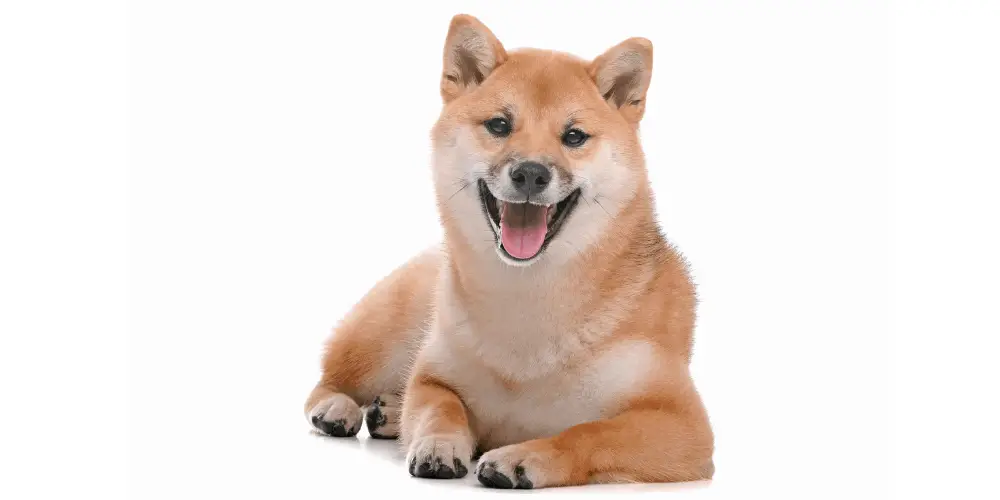- Name: Shiba Inu
- Other names: Japanese Shiba Inu, Japanese Small Size Dog, Shiba Ken, Shiba
- Origin: Japan
- Size: Type Small
- Breed: Group Non-Sporting Breeds
- Life span: 12 to 15 Years
- Temperament: Charming, Confident, Fearless, Keen, Alert, Faithful
- Height Male: 35–43 cm Female: 33–41 cm
- Weight Male: 8–11 kg Female: 6.8–9 kg
- Colors: Black Sesame, Sesame, Black & Tan, Red Sesame, Red
- Puppy Price: $2k – $5k
Breed Overview
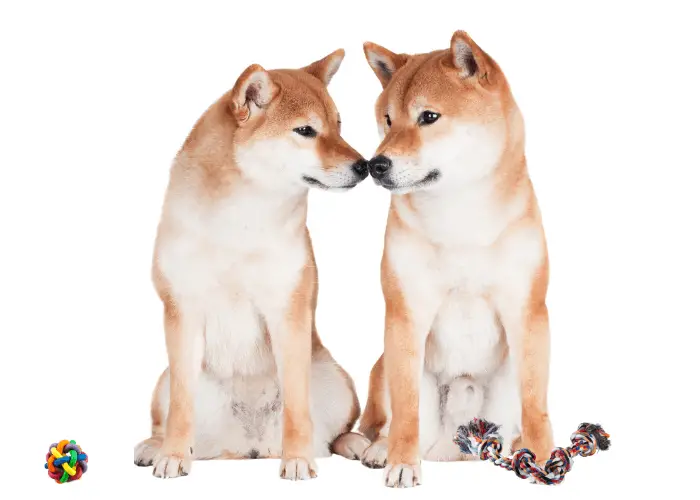
Shiba Inu, the dog breed from Japan with a curly tail, prick ears, and squinty eyes, may look like a fox or even a stuffed toy, but it is neither.
Dogs from this breed are very popular in Asia and possibly the most ancient and smallest of six spitz dogs native to the Land of the Rising Sun.
The Shiba Inus are known for having bold and fiery personalities. In Japanese, there happen to be three particular words that are used to describe the mental traits of this breed, which are soboku (meaning alertness), ryosei (meaning good nature), and kaani-i (meaning spirited boldness). This breed’s intelligent, interesting, and strong-willed temperature is made of a combination of these traits.
- Good with Kids:
- Cat Friendly:
- Dog Friendly:
- Trainability:
- Shedding:
- Watchdog:
- Intelligence:
- Grooming:
- Popularity:
- Adaptability:
- Hypoallergenic: No
Body Type
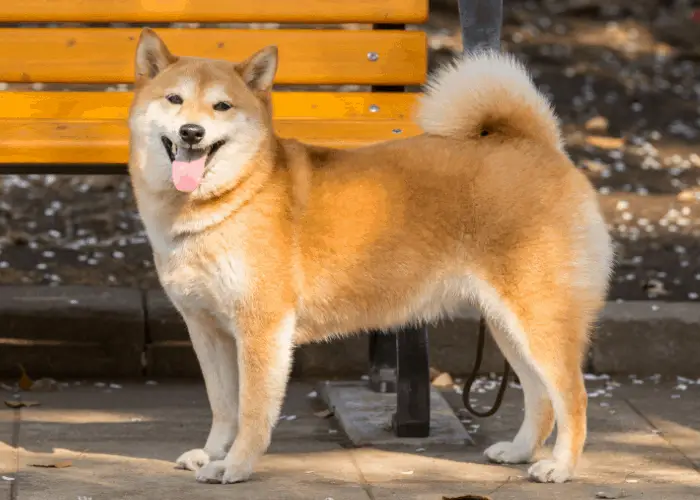
The Shiba Inus are athletic dogs; quite like a ninja, they tend to move effortlessly, nimbly, and quickly. They also happen to be alert and keen. Shiba Inus tend to be compact; their muscles are always well-developed, while their bone is moderate.
At withers, the body of the males measures somewhere between 14.5 and 16.5 inches tall, while the females have a height between 14.5 and 15.5 inches.
The males tend to be slightly heavier than the females, weighing around 23 pounds, while the females usually weigh around 17 pounds.
The head of the Shiba Inus tends to be in proportion with its body. They have a round muzzle with a moderate stop that tapers toward the nose a bit.
Their lips tend to be tight, and their teeth meet in a scissors bite. Their eyes are deep-set, dark in color, and triangular in shape with black eye rims.
They have small, triangular, erect ears. They have straight front legs, and it is possible to remove dewclaws. They have a thick high-set tail at the base, with a ring or a sickle curve as it carries over the back.
Coat
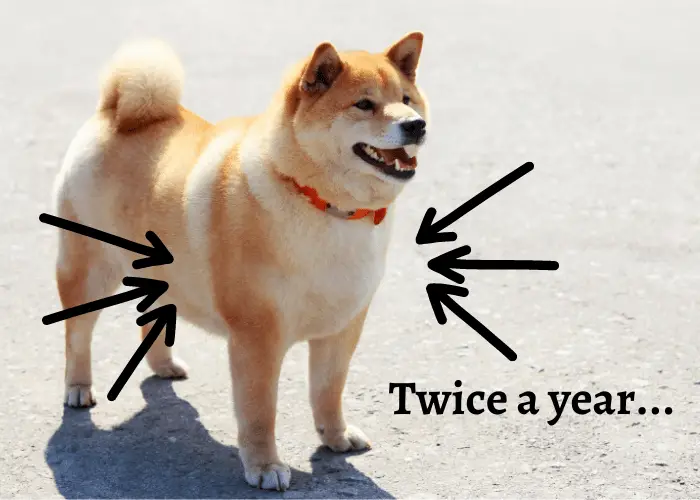
Shiba Inus are double-coated dogs, and it is because of the thick double coat they tend to look like stuffed animals. They have a stiff and straight outer coat and a soft and thick undercoat. They have short fur, even on their fox-like ears, face, and legs.
Their guard hairs are usually 11.5 to 2 inches long at the withers. They have a bit longer tail hair that stands open in a brush. They shed their coat moderately throughout the year, and twice a year, they shed heavily when they “blow” coats.
When it comes to grooming, maintaining their coat is fairly easy. They naturally prefer to stay clean and odor-free. They do not require a brush to remove dead hair, and oils are distributed once a week or more often whenever shedding heavily.
It is better to bathe them occasionally since their coat and skin can dry out if they are over-bathed. Bathing them every 3 to 4 months should be enough.
Color
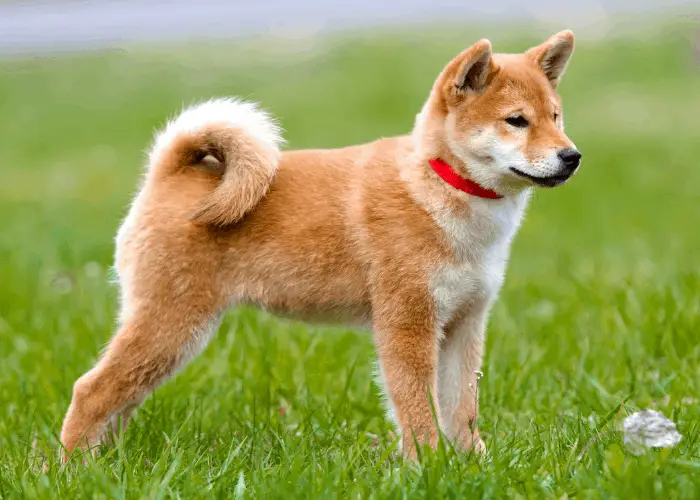
Shiba Inus may be black, red, tan, or sesame (black-tipped hairs with a red base), with a buff, cream, or grey undercoat. They may also be cream (white), although this color is regarded as a “major fault.”
Urajiro, which means “underside white,” refers to the required markings on the forelegs and hind legs and the tip of the tail of a Shiba ‘nu, which is not visible in the cream-colored coat.
Temperament
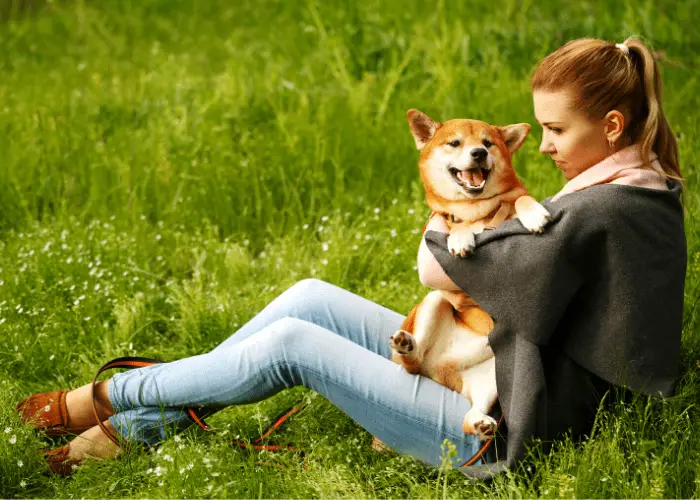
As long as Shiba Inus are well-bred, they can be alert, bold, and good-natured. They are confident and strong-willed, and they often tend to have their ideas. They can be affectionate and loyal to their family, though they may treat strangers with suspicion.
Shiba Inus are not good at sharing. They may guard their food, territory, or toys aggressively. They may not get along with other dogs, especially if they are intact, and they may even chase small animals, perhaps other household pets, that they consider prey.
RELATED ARTICLE: Shiba Inu Pros and Cons
Although Shiba Inus happen to be smart dogs, they do things the way they feel, so it can be tricky to train them. They have also been described as freethinking.
Looking to train your dog in the Japanese language? –
Check out the Basic Japanese Dog Commands Article Now!
Numerous factors, such as heredity, socialization, and training, may affect their temperaments. Shiba Inu puppies can be curious and playful and may even approach and want to be held by people.
Early socialization is a must for this breed, which means they should be exposed to different experiences, people, sights, and sounds when they are young. This way, a Shiba Inu puppy will grow into a well-rounded dog.
[ Get to know the Doge Meme Story ]

